Related Research Articles

Edward I, also known as Edward Longshanks and the Hammer of the Scots, was King of England from 1272 to 1307. Concurrently, he was Lord of Ireland, and from 1254 to 1306 ruled Gascony as Duke of Aquitaine in his capacity as a vassal of the French king. Before his accession to the throne, he was commonly referred to as the Lord Edward. The eldest son of Henry III, Edward was involved from an early age in the political intrigues of his father's reign. In 1259, he briefly sided with a baronial reform movement, supporting the Provisions of Oxford. After reconciling with his father, he remained loyal throughout the subsequent armed conflict, known as the Second Barons' War. After the Battle of Lewes, Edward was held hostage by the rebellious barons, but escaped after a few months and defeated the baronial leader Simon de Montfort at the Battle of Evesham in 1265. Within two years, the rebellion was extinguished and, with England pacified, Edward left to join the Ninth Crusade to the Holy Land in 1270. He was on his way home in 1272 when he was informed of his father's death. Making a slow return, he reached England in 1274 and was crowned at Westminster Abbey.
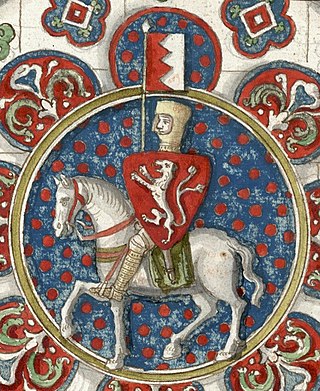
Simon de Montfort, 6th Earl of Leicester, later sometimes referred to as Simon V de Montfort to distinguish him from his namesake relatives, was an English nobleman of French origin and a member of the English peerage, who led the baronial opposition to the rule of King Henry III of England, culminating in the Second Barons' War. Following his initial victories over royal forces, he became de facto ruler of the country, and played a major role in the constitutional development of England.
Ranulf Flambard was a medieval Norman Bishop of Durham and an influential government official of King William Rufus of England. Ranulf was the son of a priest of Bayeux, Normandy, and his nickname Flambard means incendiary or torch-bearer, and may have referred to his personality. He started his career under King William I of England, probably in the compilation of the Domesday Book of 1086, as well as being the keeper of the king's seal. On the death of William I, Ranulf chose to serve the new king of England, William Rufus.
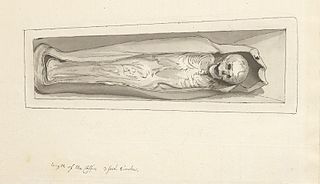
Hugh of Lincoln was an English boy whose death in Lincoln was falsely attributed to Jews. He is sometimes known as Little Saint Hugh or Little Sir Hugh to distinguish him from the adult saint, Hugh of Lincoln. The boy Hugh was not formally canonised, so "Little Saint Hugh" is a misnomer.

William of Norwich was an apprentice who lived in the English city of Norwich. He suffered a violent death during Easter 1144. The city's French-speaking Jewish community was blamed for his death, but the crime was never solved. William's case is the first known example of a medieval blood libel.

The history of the Jews in England goes back to the reign of William the Conqueror. Although it is likely that there had been some Jewish presence in the Roman period, there is no definitive evidence, and no reason to suppose that there was any community during Anglo-Saxon times. The first written record of Jewish settlement in England dates from 1070. The Jewish settlement continued until King Edward I's Edict of Expulsion in 1290.

England in the Middle Ages concerns the history of England during the medieval period, from the end of the 5th century through to the start of the early modern period in 1485. When England emerged from the collapse of the Roman Empire, the economy was in tatters and many of the towns abandoned. After several centuries of Germanic immigration, new identities and cultures began to emerge, developing into kingdoms that competed for power. A rich artistic culture flourished under the Anglo-Saxons, producing epic poems such as Beowulf and sophisticated metalwork. The Anglo-Saxons converted to Christianity in the 7th century, and a network of monasteries and convents were built across England. In the 8th and 9th centuries, England faced fierce Viking attacks, and the fighting lasted for many decades. Eventually, Wessex was established as the most powerful kingdom and promoted the growth of an English identity. Despite repeated crises of succession and a Danish seizure of power at the start of the 11th century, it can also be argued that by the 1060s England was a powerful, centralised state with a strong military and successful economy.
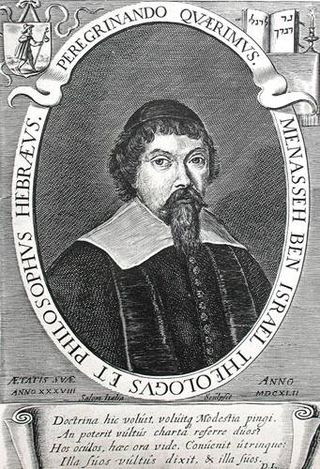
Manoel Dias Soeiro, better known by his Hebrew name Menasseh or Menashe ben Israel, was a Jewish scholar, rabbi, kabbalist, writer, diplomat, printer, publisher, and founder of the first Hebrew printing press in Amsterdam in 1626.
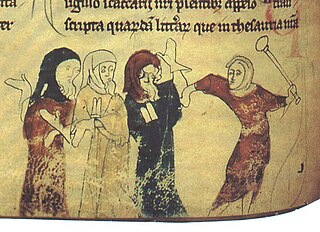
The Edict of Expulsion was a royal decree expelling all Jews from the Kingdom of England that was issued by Edward I on 18 July 1290; it was the first time a European state is known to have permanently banned their presence. The date of issuance was most likely chosen because it was a Jewish holy day, the ninth of Ab, which commemorates the destruction of Jerusalem and other disasters the Jewish people have experienced. Edward told the sheriffs of all counties he wanted all Jews expelled before All Saints' Day that year.

The first Jews in England arrived after the Norman Conquest of the country by William the Conqueror in 1066, and the first written record of Jewish settlement in England dates from 1070. Jews suffered massacres in 1189–90, and after a period of rising persecution, all Jews were expelled from England after the Edict of Expulsion in 1290.
Hugh de Puiset was a medieval Bishop of Durham and Chief Justiciar of England under King Richard I. He was the nephew of King Stephen of England and Henry of Blois, who both assisted Hugh's ecclesiastical career. He held the office of treasurer of York for a number of years, which led him into conflict with Henry Murdac, Archbishop of York. In 1153, Hugh was elected bishop of Durham despite the opposition of Murdac.
Cecil Roth was an English historian. He was editor-in-chief of the Encyclopaedia Judaica.

Lucien Wolf was an English Jewish journalist, diplomat, historian, and advocate of rights for Jews and other minorities. While Wolf was devoted to minority rights, he opposed Jewish nationalism as expressed in Zionism, which he regarded an incentive to anti-Semitism. In 1917 he co-founded the anti-Zionist League of British Jews.

The Great Synagogue of London was a former Orthodox Jewish congregation and synagogue, located in the City of London, England, in the United Kingdom. The synagogue was, for centuries, the centre of Ashkenazi life in London. Built north of Aldgate in the 17th century, it was destroyed during World War II, in the Blitz.
The Statute of Jewry was a statute issued by Henry III of England in 1253. In response to widespread anti-Jewish sentiment, Henry attempted to segregate and debase England's Jews with oppressive laws which included imposing the wearing of a yellow Jewish badge to invite the Christian public's disdain.
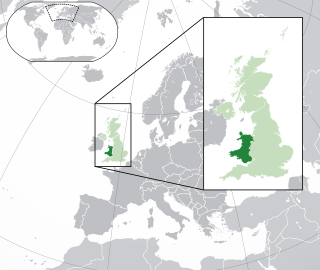
The history of the Jews in Wales begins in the 13th century. However, after the English conquest of Wales (1277–1283), Edward I issued the 1290 Edict of Expulsion expelling the Jews from England. From then until the formal return of the Jews to England in 1655, there is only one mention of Jews on Welsh soil.
Carucage was a medieval English land tax enacted by King Richard I in 1194, based on the size—variously calculated—of the taxpayer's estate. It was a replacement for the danegeld, last imposed in 1162, which had become difficult to collect because of an increasing number of exemptions. Carucage was levied just six times: by Richard in 1194 and 1198; by John, his brother and successor, in 1200; and by John's son, Henry III, in 1217, 1220, and 1224, after which it was replaced by taxes on income and personal property.
The Exchequer of the Jews was a division of the Court of Exchequer at Westminster which recorded and regulated the taxes and the law-cases of the Jews in England and Wales. It operated from the late 1190s until the eventual expulsion of the Jews in 1290.
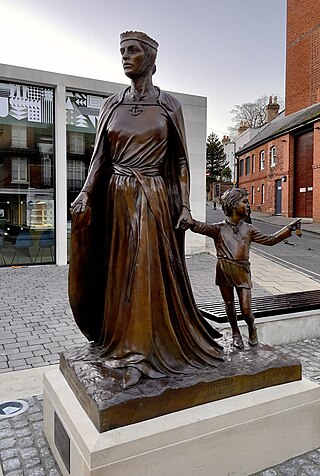
Licoricia of Winchester was an English Jewish businesswoman, who like all English Jews of the period had to navigate the perilous waters of only being able to stay if they were financially useful to the Crown. She has been described by historian Robert Stacey as "the most important Jewish woman in medieval England".
Israel Finestein QC MA (1921–2009), an English barrister and Deputy High Court Judge, was a leader and historian of British Jewry. His writings analysed the history of divisions amongst the Jews of England; in varied roles he worked for communal change and reconciliation.
References
Notes
- ↑ Richardson quotes Poole's volume III of the Oxford History of England : "The ostentation which possession of great wealth enabled the Jews to display, and their unconcealed contempt for the practices of Christianity, made them an object of universal dislike; as usurers, moreover, they had gained a strangle-hold on the recently-founded monastic houses whose splendid buildings they had financed, and on many of the smaller aristocratic families"; [13] unchanged from the 1951 edition; still in print in the late 1980s
Citations
- ↑ Lee 1899
- 1 2 Huscroft 2006 , p. 18
- ↑ Quoted in Skinner 2003 , p. 4
- ↑ Roth 1964 (third edition)
- ↑ Richardson 1960; Huscroft 2006 , pp. 18–19
- ↑ Quoted in Richmond 1992 , p. 43
- ↑ Huscroft 2006 , pp. 19–20
- ↑ Skinner 2003 , p. 1
- ↑ Richmond 1992, Skinner 2003 , p. 1, Stacey 2011
- ↑ Huscroft 2006 , p. 20
- ↑ Richardson 1960 , p. 213 "The insularity of English historians led them to a conception of Edward as an English hero: in truth he was neither English nor heroic, and this truth is slowly being realized"
- ↑ Richardson 1960, p. vii.
- ↑ Poole 1955, p. 353.
- ↑ Richmond 1992 , p. 47
- ↑ Richmond 1992 , pp. 51–2
Sources
- Hillaby, Joe (2003). "Jewish Colonisation in the Twelfth Century". In Skinner, Patricia (ed.). Jews in Medieval Britain. Woodbridge: Boydell Press. pp. 15–40. ISBN 978-1-84383-733-6.
- Huscroft, Richard (2006). Expulsion: England's Jewish solution. Stroud: Tempus. ISBN 978-0-752-43729-3. OL 7982808M.
- Lee, Sidney (1899). . In Lee, Sidney (ed.). Dictionary of National Biography . Vol. 57. London: Smith, Elder & Co. pp. 89–90.
- Poole, Austin L. (1955). Domesday Book to Magna Carta. The Oxford History of England (Second ed.). Oxford: Oxford University Press. ISBN 0198217072.
- Richardson, Henry (1960). English Jewry under Angevin Kings. London: Methuen. OL 17927110M.
- Richmond, Colin (1992). "Englishness and Medieval Anglo-Jewry". In Kushner, Tony (ed.). The Jewish Heritage in British History. Frank Cass. pp. 42–59. ISBN 0-7146-3464-6.
- Roth, Cecil (1964). A history of the Jews in England (Third ed.). Oxford: Clarendon Press. ISBN 978-0198224884.
- Skinner, Patricia (2003). "Introduction". In Skinner, Patricia (ed.). Jews in Medieval Britain. Woodbridge: Boydell Press. pp. 1–11. ISBN 0851159311.
- Stacey, Robert (2011). "Review of The King's Jews: Money, Massacre and Exodus in Medieval England, (review no. 1077)". Reviews in History.